Gillings School announces 6 GIL awards to study generative AI in public health
December 14, 2023
By Amma Agyemang-Duah, Gillings School Communication Fellow
The UNC Gillings School of Global Public Health proudly announces the eighth round of Gillings Innovation Lab awardees. Six Gillings School faculty members were awarded $100,000 each to pursue research using generative artificial intelligence (gAI) that focuses on solving real-world problems over the next two years. The utilization of gAI is gaining traction in multiple fields, and this surge in interest makes right now an opportune moment to focus on harnessing gAI in public health.
Awardee project teams are representative of six departments in the Gillings School and involve campus partners, including Project Malawi, RENCI, and CHAI Core; external collaborators, including community partners from Wake County, Washington D.C., and Florida; industry partners from DL Analytics and Amazon Web Services (AWS); academic institutions at George Mason University and Duke University; and scientists from the Environmental Defense Fund.
The round eight winners are Jennifer S. Smith, PhD, professor in the Department of Epidemiology; Lauren Hill, PhD, assistant professor in the Department of Health Behavior; Hongtu Zu, PhD, professor in the Department of Biostatistics; Brooke Nezami, PhD, assistant professor in the Department of Nutrition; William Vizuete, PhD, professor in the Department of Environmental Sciences and Engineering; and Sean Sylvia, PhD, associate professor in the Department of Health Policy and Management.
Their research spans several health topics, including cervical cancer screening in Malawi, decision-making around HIV treatment, modeling for brain-related disorders, behavior change for weight management, poor air quality, and standards of primary care in marginalized populations around the world. These projects encompass local and global health, policy, and community engagement, with equity infused throughout.
Gillings Innovation Labs are made possible by the foundational 2007 Gillings Gift, which has invested nearly $8M and led to $155M in follow-on funding and 233 scholarly publications. Co-funders for this round include the UNC Lineberger Comprehensive Cancer Center and the Gillings School’s Institute for Environmental Health Solutions.
Jennifer S. Smith, PhD
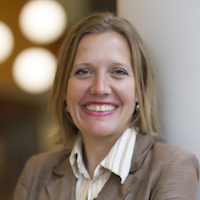
Dr. Jennifer Smith
Smith is a professor in the Department of Epidemiology and is affiliated with the UNC Lineberger Comprehensive Cancer Center, UNC Center for Aids Research and the UNC Center for Women’s Health Research. Her research focuses on the global prevention of human papillomavirus (HPV) and cervical cancer worldwide (primarily in Kenya, Malawi, Nigeria and North Carolina), with an emphasis on prevention via screening, HPV self-sampling and prophylactic vaccines. Smith’s project, co-funded by UNC Lineberger, will focus on exploring artificial intelligence based on automated visual evaluation (AVE) for cervical cancer prevention. Smith will be partnering with DL Analytics and using images from patients who underwent cervical cancer screening and cervical image capture in Malawi.
Other collaborators include Jennifer Tang, Michael Hudgens, Siobhan O’Connor, Anisha Loeb, Lameck Chinula, Friday Saidi, John Chapola and David Levitz.
“We’re grateful to be chosen as a Gillings lab for our artificial intelligence project in collaboration with colleagues from UNC project Malawi,” Smith said. “AI has clear potential to improve the cervical cancer screening algorithm to make it much simpler to diagnose precancerous lesions early enough to facilitate timely treatment and save lives.”
Lauren Hill, PhD
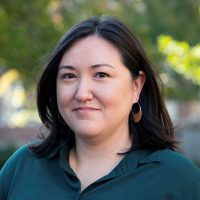
Dr. Lauren Hill
Hill is an assistant professor in the Department of Health Behavior. She develops and evaluates behavioral interventions to address multilevel determinants of HIV/AIDS risk and treatment outcomes globally and domestically. Her current research focuses on developing both community- and clinic-based interventions to promote women’s uptake and effective use of pre-exposure prophylaxis for HIV prevention in Malawi and N.C. Hill’s project focuses on harnessing large language models to bring shared decision-making counseling for HIV prevention to scale.
Other collaborators include Shashank Srivasta and Christopher Sellers.
“I’m very excited to work on this interdisciplinary project with colleagues in computer science and the School of Medicine to advance the quality of patient education and decision support resources with the power of AI,” said Hill. “This award is a really wonderful mechanism not just to promote innovation in public health but to foster new collaborations across disciplines, which is really exciting.”
Hongtu Zhu, PhD
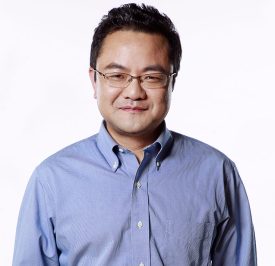
Dr. Hongtu Zhu
Zhu is a professor in the Department of Biostatistics and is also affiliated with the UNC Biomedical Imaging Research Center, UNC Lineberger, and the Departments of Statistics, Genetics, Computer Science, and Radiology. He is an internationally recognized expert in statistical learning, medical image analysis, precision medicine, biostatistics, artificial intelligence and big data analytics. Zhu’s project will focus on knowledge-enhanced foundation models for brain-related disorders (KFM-BD).
Other collaborators include Yun Li, Xihao Li, Jason Stein, Gwenn Garden, Christopher Bizon and Joe Piven
“I am deeply honored to receive this award, recognizing our innovative work in the Gillings Innovation Labs project,” Zhu said. “Our initiative KFM-BD represents a significant stride in utilizing generative AI for brain disorder (BD) research. This multidisciplinary venture, which brings together experts in AI, neurology and biostatistics, demonstrates our commitment to pushing the frontiers of healthcare research.
“This award is a catalyst for future explorations. It reinforces our dedication to blending advanced technology with clinical insights to uncover novel genes and pathways in BD research. We are enthusiastic about the prospective contributions of our work to the broader scientific community and sharing our findings and tools to drive further innovation in the field.”
Brooke Nezami, PhD
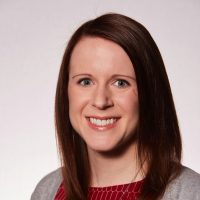
Dr. Brooke Nezami
Nezami is an assistant professor in the Department of Nutrition. She is a behavioral scientist with more than nine years of experience in behavioral weight control interventions. Her research focuses on using technology to increase adherence and improve dietary behaviors and increase physical activity in young adults and families with young children. She is joined by fellow principal investigators Carmina Valle, PhD, and Deborah Tate, PhD. Their project focuses on leveraging generative AI in mobile health promotion programs as a use case for enhancing tailored messaging and engagement in a mobile healthy weight.
Other collaborators include Vincent Toups, Nikki Freeman and Lex Hurley.
“This award will extend our innovative work on delivering just-in-time support to promote behavior change by integrating large language models and chatbots into a healthy weight app,” said Nezami. “Current curiosity about artificial intelligence presents a unique opportunity for us to capitalize on this interest for public health. The use of generative AI in public health is new and unknown, so we will work carefully with our team and Amazon Web Services (AWS) to test the safety and feasibility of using a gAI-driven chatbot for this purpose. We hope that this will continue to improve the reach and effectiveness of evidence-based mobile programs for health and wellness.”
William Vizuete, PhD
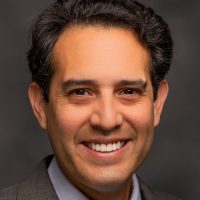
Dr. William Vizuete
Vizuete is a professor in the Department of Environmental Sciences and Engineering. Tackling problems of air pollution, mortality and climate change are the global public health issues that motivate Vizuete’s research. In his research, he focuses on understanding how the atmosphere can change the formation processes of ozone and particulate matter and its connection to human health. Through this research, he has increased our scientific knowledge in these areas and produced new insights through air quality models (AQMs), field studies, laboratory experiments and the development of a patented novel in-vitro technology. Vizuete’s project, co-funded by the Gillings School’s Institute for Environmental Health Solutions, focuses on the use of artificial intelligence for computationally efficient predictions of air quality to design effective policies for vulnerable communities.
“Artificial intelligence now makes it possible for communities to make air quality forecasts, without needing a large supercomputing cluster, putting a powerful tool within reach of those who need it most,” said Vizuete.
Sean Sylvia, PhD

Dr. Sean Sylvia
Sylvia is an associate professor in the Department of Health Policy and Management. His work uses experimental and quasi-experimental methods to study innovative approaches to improve the delivery of health services in underserved communities globally. He currently leads the Digital Health Economics and Policy (DHEP) Lab, which convenes interdisciplinary teams to weave insights from the behavioral, data and computer sciences into transformative health policy research suited for the digital age. Sylvia’s project focuses on utilizing reinforcement learning with collective expert feedback to advance the use of generative AI for primary care.
Other collaborators include Tara Templin, Junier Olivia, Liz Chen, Michael Kosorok, Kat Tumlinson, Joseph Tucker and Diane Pozefsky.
“We are thrilled to embark on this project,” Sylvia said. “If successful, we believe it has the potential to both make methodological advancements and bridge data gaps that limit the ability of many communities around the world to leverage AI and machine learning to improve health. Working with CFK Africa, our goal is to craft a community-engaged approach, utilizing local expertise to address this challenge.”
Contact the UNC Gillings School of Global Public Health communications team at sphcomm@unc.edu.
